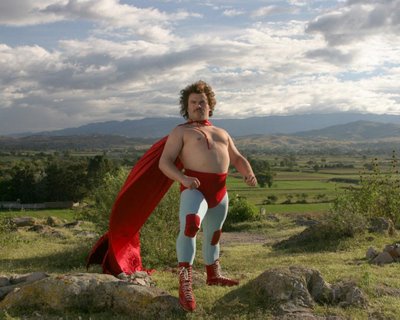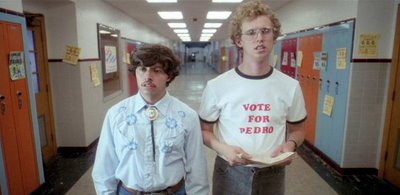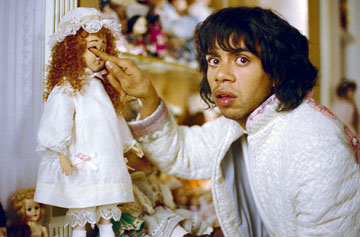
Our eldest child--who has just turned 18, and insists she is an adult; oh, what japes!--is on the verge of entering college, and has decided to accept at least one responsibility of adulthood: She has a job. Actually, I'm not sure how much of a burden she's shouldered, for two reasons. First, although she's working ostensibly to have enough money for textbooks (whose total cost will, of course, be a grand sum dreamed of only in Ali Baba's deepest, most golden slumbers), given her conspicuous consumerism, at least on the heels of her first paycheck or two, we will need to wait until September to see how much she has actually saved. (As always, though, I remain confident in my children's ability not to disappoint me or themselves. The alternative, of course, is the bitter imposition of father-guilt, almost as strong as mother's.) But, in judging the maturity of her move toward gainful employment, I am less suspicious of her goal of "financial impregnability" (a phrase favored by the president of the college where I work, evoking again a fabulous promise of "Open sesame!" and the glowing cave of treasure) than I am of the "maturity" of the nature of her work--to be honest, what I myself had considered the dream job of my youth, a dream I regretfully never realized: movie usher.
A pause as we consider the cliched but deeply true physics of falling fruit relative to distance from point-of-origin tree. The result: A Humble Viewer with a flashlight.
But all fiscal and developmental considerations melt away in the heat of the central perk of her position: free movies. And not just for her. In an effort to encourage family values--interpreted here as being able to sit next to each other in a row and stare at a movie screen--her parents get in for free, too. Aside from the fact that concession costs suddenly no longer need to be measured in parsecs, a kind of relief/elation--Can this be true? Is it possible to ignore the bullying cost of a movie ticket?--settles in, and I find myself actually not before the Home Living and Entertainment Center to watch a movie.
And which film did we choose to inaugurate this new age, this Dolby Digital dawn of the gratis widescreen? Nacho Libre, natch. Of course, in some ways it didn't matter. After all, our daughter, that light of our lives, has opened wide the curtain, so to speak (I can't write "literally," since it's been twenty-five years since I've seen an actual curtain part in a movie theater), and choosing which movie to attend is no longer a corporate affair, with spreadsheets and quarterly projections, not to mention backroom deals and hostile takeovers--oh, the careers made (and lost) in the great let's-see-King-Kong buy-in; the boardroom still quivers from the tension of that decision--but still, given our family's collective inclinations, Jack Black in tights was a fitting start.
 Minutes before we left, I admit I checked Ebert's review. I hadn't read anything about Nacho Libre, but I knew it was directed and written by Jared Hess, with his wife Jerusha, whose debut, Napoleon Dynamite, I could watch at least once a week--and co-written by Mike (School of Rock/Chuck and Buck) White. There's nothing like "home-woven handicrafts." Well, Ebert pretty much dismissed Nacho, and this worried me, but my daughter reminded me how deeply I was committed to Napoleon Dynamite and all the sweet moves Hess managed with that one, so off we went.
Minutes before we left, I admit I checked Ebert's review. I hadn't read anything about Nacho Libre, but I knew it was directed and written by Jared Hess, with his wife Jerusha, whose debut, Napoleon Dynamite, I could watch at least once a week--and co-written by Mike (School of Rock/Chuck and Buck) White. There's nothing like "home-woven handicrafts." Well, Ebert pretty much dismissed Nacho, and this worried me, but my daughter reminded me how deeply I was committed to Napoleon Dynamite and all the sweet moves Hess managed with that one, so off we went.And watching it, I was reminded how going to the movies can be a social experience. A friend of mine insists otherwise, and conjures up that culpatory image of everyone in a row in the dark. But I had forgotten how a comedy builds strength from the audience--even if, as in Nacho's case, that strength came from only five audience members: my wife, kids, and myself. No one else was laughing much, but we fell right into the deadpan sly affection of the script and performances. Jack Black's Nacho is the only non-Latino in the movie, and glaringly so: He is often shirtless, and aggressively pasty. And the rest of the cast, accepting Hess' Fellini leanings, pose in presentational deadpan, so that we can marvel at their simultaneously deep and vacant expressions. Only Ana de la Reguera as Sister Encarnacion seems to be actually acting--and almost in another movie, a more straightforwardly silly comedy, maybe with someone from the cast of Friends. Her performance, though, serves to heighten Black's improvisational self-absorption and the rest of the cast's impervious swarthiness.
 At the core of Nacho are two urges: gags and God. They never quite come together, but I couldn't help noting how Nacho's wrestling partner, the chip-stealing, corn-loving Esqueleto (Hector Jimenez), asserts that he doesn't believe in God, but science--then suggests Nacho eat eagle's eggs for their magical properties. And Nacho himself doesn't succeed as a wrestler until he, like a Blues Brother, makes winning a mission from God. I suppose one can easily dismiss this "spiritual" element without hurting the picture, but Hess seems in the end to salute his freaks' faith--jeez; is he the Tod Browning of comedy? Or was Felinni? I'm not sure, and I don't care. All I know is that there's something hilarious about Nacho's entire demeanor as, still glowing from his first wrestling match, he glories, "Do you remember when everyone was shouting my name, and I used my strength to rip my blouse?" And this seems perfectly to coincide with Nacho's dark night, when he prays, "Precious Father, why have you given me this desire to wrestle and then made me such a stinky warrior?" It is a question I ask myself frequently.
At the core of Nacho are two urges: gags and God. They never quite come together, but I couldn't help noting how Nacho's wrestling partner, the chip-stealing, corn-loving Esqueleto (Hector Jimenez), asserts that he doesn't believe in God, but science--then suggests Nacho eat eagle's eggs for their magical properties. And Nacho himself doesn't succeed as a wrestler until he, like a Blues Brother, makes winning a mission from God. I suppose one can easily dismiss this "spiritual" element without hurting the picture, but Hess seems in the end to salute his freaks' faith--jeez; is he the Tod Browning of comedy? Or was Felinni? I'm not sure, and I don't care. All I know is that there's something hilarious about Nacho's entire demeanor as, still glowing from his first wrestling match, he glories, "Do you remember when everyone was shouting my name, and I used my strength to rip my blouse?" And this seems perfectly to coincide with Nacho's dark night, when he prays, "Precious Father, why have you given me this desire to wrestle and then made me such a stinky warrior?" It is a question I ask myself frequently.But before I obscure the core delights of this movie, I want to remind myself of the giddy joy of the wrestling scenes, that seem so Tex Avery-ish and startling--I know digital imaging can cut-n-paste a movie anywhere it wants to go, but Black bounds around with sudden nimbleness, as clueless as he is appealing, flinging himself into an extrovert's paradise of bare-chested abandon. And his interaction--often in terms of a collision--with the movie's often infinitely more stolid characters provides a study in opposites that's funny because it's not true, but a kind of Bizarro planet utopia, in which the fools win against all odds, as in the best silent comedies. It's just that Nacho Libre is louder.
1 comment:
Nice article, straight to the point and easy to understand.
If someone is searching for more practical info, this site can help.
Have a look at azmip.
Post a Comment